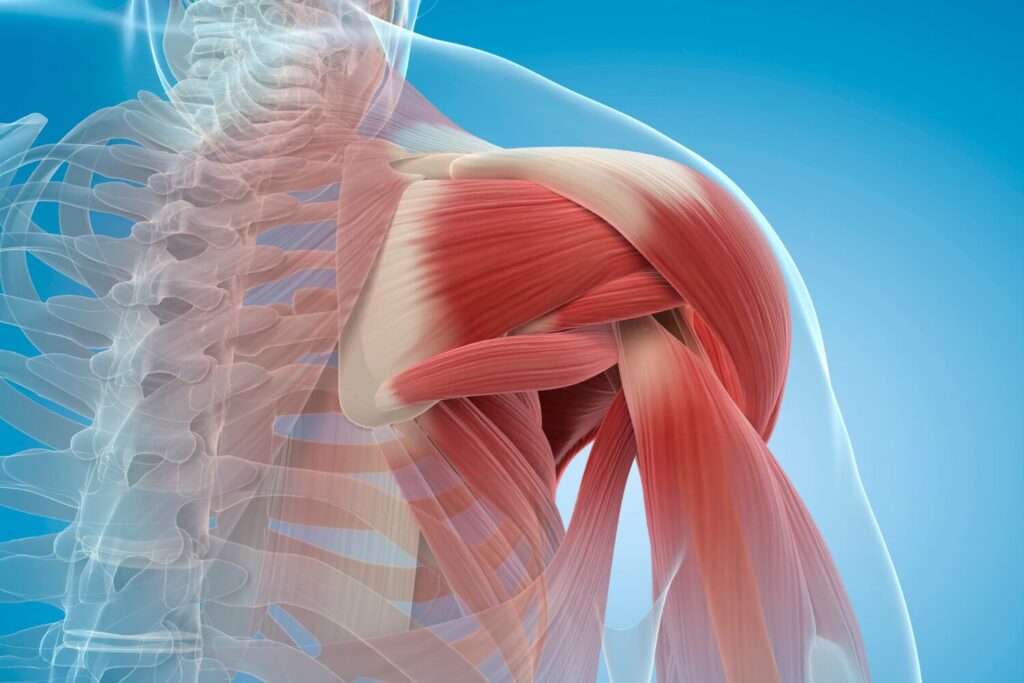The rotator cuff, a critical component of the shoulder complex, plays a pivotal role in the mobility and stability of the shoulder joint.
However, despite its importance, it is susceptible to various injuries that can significantly impair its function and cause considerable painful or discomfort.
In this article, we delve into the causes of rotator cuff injuries and explore effective rehabilitation techniques to facilitate recovery.
Understanding Rotator Cuff Injuries
Anatomy of the Rotator Cuff
Before delving into the causes of rotator cuff injuries, it’s essential to understand the anatomy of this crucial structure.
The rotator cuff comprises four muscles: the supraspinatus, infraspinatus, teres minor, and subscapularis.
These muscles, along with their tendons, work together to stabilize the shoulder joint and facilitate a wide range of motion.

Rotator Cuff Injuries Causes
- Traumatic Injuries: Rotator cuff injuries can occur due to trauma, such as falls, direct blows to the shoulder, or sudden jerking motions. These traumatic events can tear or strain the tendons of the rotator cuff, leading to pain and restricted movement.
- Repetitive Stress: Overuse of the shoulder joint, commonly seen in athletes who engage in sports such as baseball, tennis, or swimming, can result in repetitive stress injuries to the rotator cuff muscles. Activities that involve repetitive overhead motions put excessive strain on the tendons, eventually leading to tears or inflammation.
- Age-related Degeneration: As we age, the tendons of the rotator cuff undergo degenerative changes, becoming weaker and more prone to injury. This age-related degeneration, coupled with decreased blood flow to the tendons, increases the likelihood of rotator cuff tears and other injuries.
- Poor Posture: Prolonged periods of poor posture, such as slouching or hunching over a desk, can contribute to rotator cuff injuries. Incorrect posture places undue stress on the shoulder joint and surrounding muscles, leading to muscle imbalances and potential injury over time.
- Muscle Weakness or Imbalance: Weakness or imbalance in the muscles surrounding the shoulder joint can compromise the stability of the rotator cuff, making it more susceptible to injuries. Strengthening exercises targeting the rotator cuff and its supporting muscles can help prevent injuries and promote optimal shoulder function.
Effective Rehab Techniques for Rotator Cuff Injuries
- Physical Therapy: A tailored physical therapy program is often the cornerstone of rotator cuff injury rehabilitation. Physical therapist’s manual therapy includes prescribed exercises such as resistance band exercises to improve strength, flexibility, and range of motion while minimizing pain and inflammation.
- Manual Therapy: Hands-on techniques such as massage, joint mobilization, and soft tissue manipulation can help alleviate pain, improve circulation, and restore mobility in the shoulder joint.
- Modalities: Modalities such as ice therapy, heat therapy, ultrasound, and electrical stimulation may be used to reduce pain and inflammation, promote healing, and improve tissue flexibility.
- Progressive Exercise Program: Gradually progressing through a structured exercise program is crucial for rebuilding strength and function in the injured rotator cuff. Exercises may include a range of motion exercises, strengthening exercises, and functional activities tailored to the individual’s specific needs and goals. The exercises should be performed consistently for at least 6-8 weeks to see the improvement of symptoms.
- Activity Modification: Temporary modification or avoidance of activities that exacerbate symptoms is often necessary during the rehabilitation process. This allows the injured tissues to heal without further aggravation.

Conclusion
Rotator cuff injuries can significantly impact shoulder function and quality of life, but with proper understanding and rehabilitation, recovery is possible.
By addressing the underlying causes of injury and implementing effective rehab techniques, individuals can regain strength, mobility, and function in the shoulder joint, allowing them to return to their daily activities and hobbies with confidence.
If you suspect a rotator cuff injury, consult with a healthcare professional for a comprehensive evaluation and personalized treatment plan.
